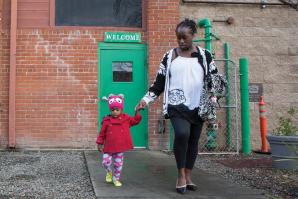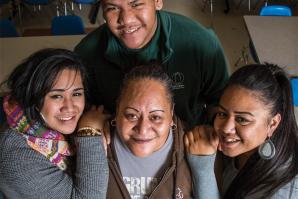I don’t remember life without sexual abuse and torment. It was my reality. Believing in anything else was foolish.
So begins the story, in her own words, of a girl who at one time found solace from abuse through Courage House, a local recovery facility looking to rescue girls from sex trafficking.
Since 2006, more than 250 girls under 18 have been rescued from sex trafficking in Sacramento, a hub on the West Coast “circuit” that includes San Francisco and Reno, Portland and Seattle, Oakland, Los Angeles and beyond. But in the Capital Region, the FBI, churches and nonprofits have decided to fight back, and together they are rescuing these children one at a time.
- – - – - – - – - – - – - – - – - – - – - – - – - – - – -
I’ve been all around the United States and overseas. I felt invisible. I felt trapped. I felt dead to know that the only time someone said that he loved me was when I was being sold to him. I feared it would always be that way.
Globally, the $32 billion sex trafficking industry exploits 4.5 million victims, and hundreds — maybe thousands — of young girls are captive locally. And not necessarily because they’re trafficked from overseas, over the border or even over state lines. According to local FBI Supervisory Special Agent Mike Rayfield, 70 percent of girls trafficked in Sacramento are, in fact, from Sacramento. It’s a harsh reality for a public naïve of the atrocity happening under their noses — pimps trafficking minors in their own towns.
“Even in your own backyard, you’re not going to find bugs until you start turning over rocks,” Rayfield says.
Rayfield supervises the Innocence Lost Task Force, the local arm of a national initiative dedicated to convicting pimps and recovering victims. The specially trained team operates undercover stings to locate these very young girls — sometimes under the age of 10 — who are forced to sell their bodies out of fear, manipulation and brainwashing.
Life was surreal. Usually, I was in rooms where clocks were removed so I would forget what day or time it was and just do what I was told. I learned not to sleep and how to pretend. I didn’t feel anything. That was the one power I had over all of the men, over my biological family and myself.
Traffickers run a secret circle of silent slavery, controlling a vulnerable population. The girls, and sometimes boys, are typically children of abusers, addicts or dealers, who are homeless or in and out of foster care. Deemed “runaways” or “throwaways,” they live as society’s orphans with no support, education, family or community.
My biological mother sold me. I was six years old, and she told me she had a surprise for me, that I had to be very good and that she wanted me to prove how much I loved her. After that moment, I knew it wouldn’t stop.
Pimps, usually in their early 20s and often involved with gangs, capitalize on these minors’ vulnerability by persuading them with a boyfriend or father figure. They lure with food, clothing and shelter.
“Once the girls think that they’re ‘loved’ — as perverse as that love is — [pimps] will start trying to talk them into prostituting for them,” Rayfield says. “But we’ve also got the ‘gorilla’ pimp that is just basically violent and forces them into it through violence and intimidation.”
I lived in fear every day of my life. I lived in fear that no one would ever love me and that I’d always have to take my clothes off to find something good about myself for them to notice.
Pimps advertise the girls online, sometimes with graphic images. Rayfield’s task force scours sites to locate the girls and make undercover “dates” to eventually contact and convict the pimp. One of the biggest challenges, he says, is convincing girls they are victims.
“We often get asked how many times we find these girls chained to a room or handcuffed to a post,” Rayfield says. “We rarely find that. But they are in kind of an emotional cage that’s hard to get out of.”
When, and if, the girls do give up the pimp, they are typically taken to juvenile hall and connected with a probation officer who may refer the girl to a recovery facility. But full recovery, a comprehensive psychological rehabilitation process experts say takes a minimum of four to five years, may not be available.
“Unfortunately, the rate of recidivism is very high,” Rayfield says. “We’ve run across familiar faces — a couple of them three or four times. Some of them are adults now, or they’re pregnant. It’s a sad life.”
And one that statistics show likely ends tragically. “The most common cause of death of someone who’s been involved in prostitution for six or more years is homicide,” he adds.
– - – - – - – - – - – - – - – - – - – - – - – - – - – - -
I was rescued when I was in my twenties. I ran away from the man’s house I was in. It was overwhelming to know I was finally out, but terrifying to realize I didn’t know where to go. I will never forget the feeling of being barefoot and running in the dark.
A 2008 John Jay College study of sex trafficked minors shows that almost 90 percent of victimized girls want to leave “the game,” but have nowhere to call home. But in the Capital Region, a rise in local nonprofits focused on the issue is improving the chances that victims will receive the necessary care to live empowered lives and reduce chances of recurrence or death.
One of the first in Sacramento,Roseville’s Agape International Missions (AIM), has been building a local infrastructure of churches and their members since 2005 to raise awareness and provide aftercare for sex trafficking victims.
AIM founders Pastor Don and Bridget Brewster of Sacramento, began the Christian-based nonprofit after learning of the international sex trafficking trade in Svay Pak, Cambodia. The Brewsters sold their home, quit their jobs and moved to Cambodia to establish rescue communities that deter sex trafficking and provide victims a safe home, education, counseling, skills training and medical care. They’ve returned to the Capital Region equipped with a model for reduction, rescue and recovery.
“We offer trainings for churches on how they can be part of preventing trafficking here in Sacramento,” says AIM’s director of operations, Clayton Butler. “We also are mobilizing for a project called Agape Safe Family, a collaboration of about four different organizations to provide emergency housing for victims.”
Butler emphasizes that successful recovery for these girls — whether across the globe or across town — requires individuals willing to sacrifice significant time or finance.
“They don’t just need someone to say ‘You’re special,’” says Butler. “They need someone to show them they’re special by spending the next two years helping them find a job.”
Acknowledging their finite resources to restore victims, AIM implores community members to go so far as to adopt and support girls during recovery.
“We are not the answer,” says Butler. “That local group of people who are passionate, they are the answer.”
– - – - – - – - – - – - – - – - – - – - – - – - – - – - -
My life is worth living now. My whole world has changed because there were good people in the world who believed it was wrong that I was sold for sex. They believed it was wrong even when I couldn’t see that yet. They wanted me to be a part of their family. I wanted to be a part of theirs. I am finally a person I am proud of.
Five years ago, Jenny Williamson heard the Brewster’s speak at her church about their experience in Cambodia.
“It was paralyzing to me,” says Williamson, a mother of three who immediately hit the Web to research the issue abroad. Not long into her research, she realized sex trafficking also hits close to home. It was a discovery she couldn’t ignore.
“We are the somebodies that have to do something,” she says.
Williamson began Courage Worldwide, a global-reaching nonprofit dedicated to restoring victims of sex trafficking to a purpose-driven life of love and community. Its residential recovery home, Courage House, opened its doors to victims in August 2011.
“This isn’t just professional to me,” she says. “This isn’t philanthropic to me. It’s my family. They’re my kids.” In fact, Williamson adopted two Courage House girls as her own.
Located in an undisclosed area of Northern California, the haven provides long-term comprehensive rehabilitation, including psychological counseling, on-site schooling, a fine arts studio, recreation, equestrian therapy and social and life skills. The site currently accommodates six girls ages 11 to 17 with future plans to house 60. Courage House also operates in Tanzania — the only home for sex trafficking victims in Africa — and another home is set to open in Hawaii, another major trafficking hub.
“The over-riding mission and purpose of Courage House is to provide a safe, loving home and family so these vulnerable young women can discover their God-given identity and destiny,” says Genny Heikka, director of communications at Courage Worldwide.
And that doesn’t just mean for the girls within Courage House walls. Heikka says Courage Worldwide has spoken to more than 25,000 people on the issue of sex trafficking and trained and certified more than 500 volunteers. This month, the organization will also gather national sex trafficking experts at William Jessup University in Rocklin for its first annual Global Sex Trafficking Summit called The Response.
Sacramento’s proactive nonprofits complement the region’s particularly effective Innocence Lost Task Force, which has made 75 arrests since 2006 and has an unparalleled 100-percent conviction rate. The numbers, says Heikka, may have falsely skewed Sacramento as one of the highest-ranking regions for sex trafficking in the country.
“Because of the secrecy of this crime, no one can really say what cities are top on the list, but one of the reasons Sacramento always seems to trend high when cross-country sting operations are done is that we have an amazing FBI task force,” she says of Rayfield’s Innocence Lost.
But law enforcement still faces challenges when it comes to diminishing demand.
Task force Detective John Sydow says “johns” usually face a misdemeanor charge, yet they rarely are convicted due to the nature of the crime. And though punishment varies among counties and on a case-by-case basis at the discretion of the district attorney, Sydow says typical penalties include a fine, a work project, a diversion program “kind of like traffic school,” or brief jail time that, in counties with crowded jails like Sacramento, may turn into home detention.
“When jails are so crowded with violent criminals, it’s hard to argue that we put johns in jail for longer periods of time,” says Sydow. “But is the existing penalty a strong deterrent? Probably not.”
Good news for victims and prosecutors statewide is the November passing of the Californians Against Sexual Exploitation (CASE) Act (Proposition 35), which increases penalties for convicted sex traffickers. Layering on the continued voice of local activists like AIM, Courage House and the girls that call Courage House home means a difference can be made in Sacramento.
As long as I have breath in my body, I want to see other girls and women come out of that nightmare. I want to use my freedom to influence theirs.
Recommended For You

Under One Roof
Can rapid rehousing save local homeless families from life on the streets and in shelters?
Though a new rapid rehousing initiative may stymy the troubling trend locally, some providers remain concerned that a lack of mandatory supportive services and intensive case management may cause the program to exacerbate, not eliminate, the problem.

From Setbacks to Scholar
St. John’s Shelter Program offers women a fresh start
A twice-convicted felon, Ronita Iulio thought she had blown her last chance to salvage her life and family. After being released from prison in 2008, Iulio was anxious to reunite with her three children, but instead she faced an unsympathetic court that granted full custody to her ex-husband.



